SO YOU WANT TO MAKE AN AUDIOBOOK
The good news is we got it done for Miz Marsha’s book “Confessions of an Instinctively Mutinous Baby Boomer” and it’s up and running and sounds great AND IS ACTUALLY SELLING!
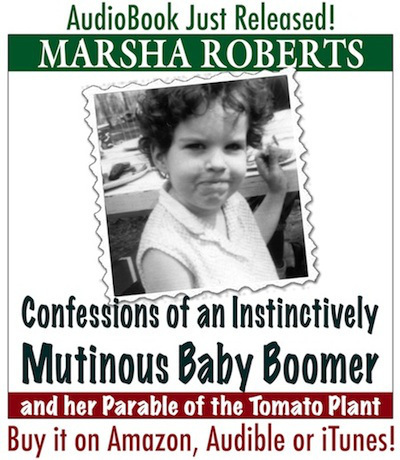
The cover for Marsha’s audiobook version of her book
The bad news: It’s a hell of a lot harder than we had any idea, and we’ve spent most of our professional lives making films and videos in varying lengths from TV spots to features. Even a feature is only around 90 minutes long. The final running time on Marsha’s book was just over . . .
SIX HOURS!
And her book is a moderate 65,000 words.
A six hour show! Nine hours for a 100,000 word book; twelve hours for a 130,000 word book.
Those are long shows!
Marsha and I created and toured a play that was just over two hours long. Believe me, that was a big show. Two hours.
A six hour show? Staggering.
A twelve hour show? Good Gawd Almighty!
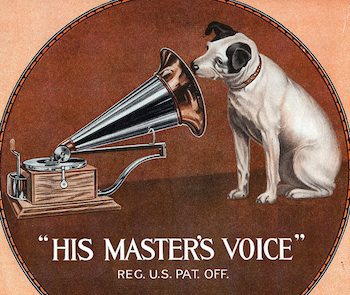
Many of the first recordings ever made were audiobooks
Now that I’ve gotten the enormity of what you’re about to attempt (I’m assuming that’s why you’re reading this) out of the way, how exactly do you do it?
There are basically two approaches to take in creating an audiobook. Whether or not you continue reading will depend on which of the two approaches you decide upon.
First approach: Find somebody with a pleasant voice and good diction (yourself, perhaps?), put him/her in front of your computer, open your handy-dandy recording app, flip to page one in your book and have them start reading. When done, edit, probably with the same app, and presto, you have an audiobook.
If this approach appeals to you, there’s no point in reading any further. Go with God.

God help you
The second approach is to create your audio book the same way you created your written book.
Professionally.
Your most important choice? Voice talent, the kind that can bring your book alive with nothing more than his/her vocal artistry. Great voice talent is readily available. Most will have samples you can download. Fees will vary enormously from no charge with a piece of the action, to thousands of dollars.
Time to play ‘Lets make a deal.’

The person you choose to record your audiobook will be your most important decision
Sometimes the price will include professional recording facilities. Convenient perhaps but pointless if you don’t get the reading you’re looking for.
Why is finding the perfect voice talent for your audiobook so important. Won’t any experienced professional do an adequate job?
Well, let me ask you a question. Did you know the original choice to play Rick in Casablanca was not Bogart but George Raft? Wouldn’t that have been a disaster, even with the same script and director? Or imagine Bette Davis playing Scarlet O’Hara, Laurence Olivier playing Conan the Barbarian.

Can you imagine anyone else playing Bogart’s role?
Old Hollywood axiom: Casting is everything. Same is true for audiobooks.
Marsha and I decided there was only one person who could do justice to her book: Della Cole. We’ve worked with Della for over 25 years in numerous film and stage productions, most notably Letters From the Front, in which she originated the lead role of Katharine Hartgrove. Much of Marsha’s book recounts our adventures with this long running show which toured the world for 15 years. Della was there for much of the time and knew most of the accounts first hand. Who better to tell the story?
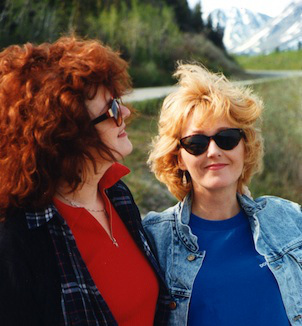
Della Cole (right) was our one and only choice to record Miz Marsha’s audiobook and as usual knocked it out of the ball park
Besides casting, you’ll have to make many other choices. Scheduling, for example. Tricky considering the program length. To get all those hours of oratory laid down, a number of recording sessions will be required over a period of days, weeks, even months.
It took us six months.
Not continuously, of course, but all involved had very busy schedules. Sometimes weeks would pass between recording sessions.
Why does that matter?
Consistency.
Recording levels, EQ, audio formats, media, microphone placement, and room tone have to match from session to session. You might assume that the recording engineer will take care of all this.
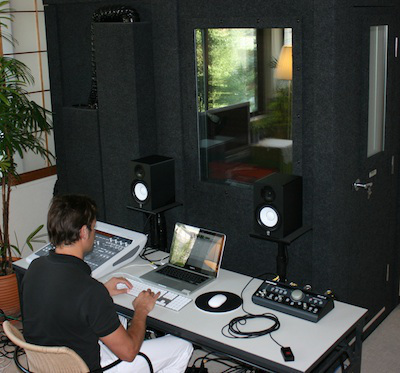
Typical voice recording studio and sound-proof booth for the talent. Gone are the days of reel-to-reel tape recorders. It’s all done digitally today.
Don’t count on it.
During the course of working on your audiobook, he/she will be working on a number of other projects, all with different recording settings.
End result?
It’s very easy for your audiobook to sound like a patchwork audio quilt and ACX (Amazon’s audiobook production division) will reject it.
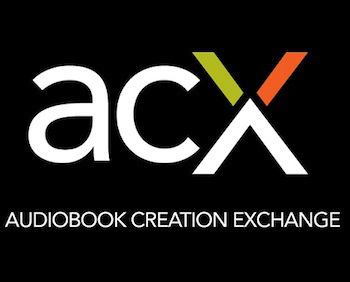
If these folks aren’t happy with how your audiobook sounds — off with your head!
That’s right. ACX won’t accept just anything you send them. If it doesn’t fit their specs, your audiobook will be rejected. Fortunately they provide detailed spec sheets and a very helpful ‘how to’ section. You can access them here.
What does all this mean?
It means that, congratulations, you are now a producer.
If you do not feel comfortable being a producer, there are professionals you can hire to do that job too. An experienced producer can make up for their fees in the money they’ll save you on wasted time, poor scheduling, and ensuring that everyone does their job properly. They know when and how to crack the whip. You don’t.
I see you’ve already got your calculator out trying to estimate how big a dent this is going to put in your children’s college fund. Next question: How much recording time will be required?
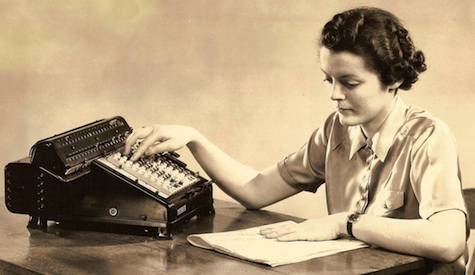
With the production of your audiobook you’ll be adding up more than word count
Again this can vary greatly due to many factors, the most important being what quality level is acceptable to you. When you were writing your book, think how many times you scoured every word and sentence, every line of dialogue, until your manuscript was the best you could make it. Nothing less was acceptable.
Same applies with an audiobook. To get it exactly the way you want it will require a number of takes, even with the best voice talent. Often the talent will ask for another take if they don’t think they got the best out of a line or segment. Only an idiot would refuse their request.
Oh, and did I mention Whispersync?
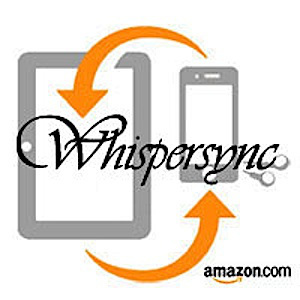
Just when you thought you knew everything . . .
What is Whispersync?
Whispersync is a very clever little magic trick developed by Amazon that allows customers to synchronize their content across various devices so they can pick up right where they left off.
In other words, somebody listening to your audiobook can at any time pick up their Kindle and it will be positioned at the exact spot where they stopped listening. Crazy, but it works and people buying your audiobook will want it to be Whispersync compatible.
What does Whispersync compatible mean to you and the production of your audiobook?
It means your recorded book will have to be word-for-word accurate with your written book. If it’s not, Whispersync may not work. Not good.
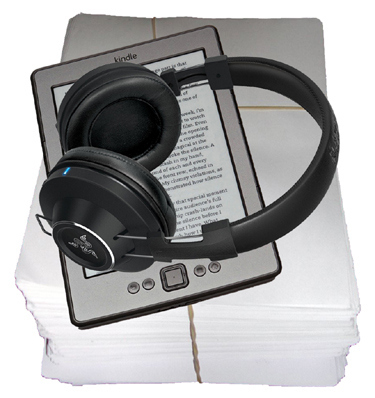
From your original manuscript to all the ebook formats to audiobook. What’s next?
It means someone will have to pay close attention during recording to ensure that the voice talent performs your book with word-for-word precision. Remember, they’re focused on performance. During playback it’ll need to be checked again.
This may seem like no big deal but take it from me, it is. You’ll be surprised how much stuff will escape your scrutiny; contractions where there should or shouldn’t be, dropped words, superfluous words added, repeated words. Catching them all becomes a bit nerve racking.
Okay, back to how much recording time will be required. For Marsha’s book, at 65,000 words, we recorded a little over 30 hours of original audio. In other words, a 5 to 1 ratio.
But there’s recording time and there’s session time. Session time includes the actual recording time plus playback time to check performance level and errors. It also includes slating, room tone, potty breaks, water breaks, takes ruined by noisy vehicles outside, doors slamming, or myriad other disturbances. It’s all part of the process.
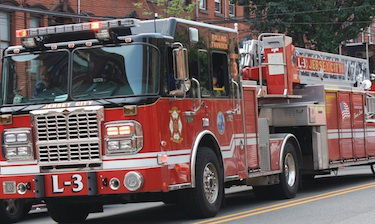
A diesel firetruck with horns and siren blaring will trump the best sound insulation of any recording booth and be picked up by the microphone
One other thing to consider: Even professional talent can seldom record beyond a three hour session. Fatigue naturally sets in and the quality of the recording sags. If you’re lucky, and schedules allow, you can record two sessions in a day.
The information I’ve given here is based on personal experience. You may do better, you may do worse. As I said earlier, I spent years as a professional filmmaker so I was one-up on the game. Cutting audio tracks – dialogue, sound effects, and music – is an integral part of the film editing process. Been there, done it. A lot.
But with an audiobook all you’ve got is dialogue. No sound effects or music to cover up mistakes or distract the ear from ‘presence’ fluctuations or other recording anomalies. Your voice recording is front and center, bare-ass naked. Better be slim, trim, and flawless.
This is just one of the many reasons I found recording and cutting an audiobook to be an arduous task. I’ll do better on my next one. Practice makes perfect. Or at least better. I hope.
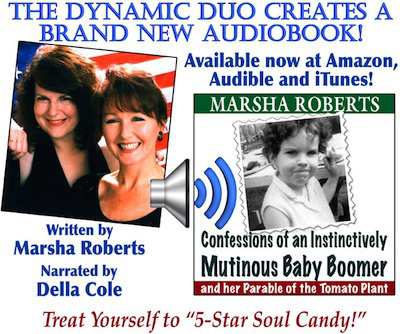
As writers, we’re used to working alone. An audiobook is a production and productions require collaboration. Relax. It’s not as bad as it sounds.
So at last the recording is done. It’s clean. It meets ACX’s recording specs. The voice talent’s performance hopefully exceeds your expectations.
Time to break out the champagne.

Go ahead. You deserve it.
But wait! There’s more!
You now have to edit it.
But I’m going to cut you some slack here and save that for my next blog. For the time being, relax and enjoy your champagne.




